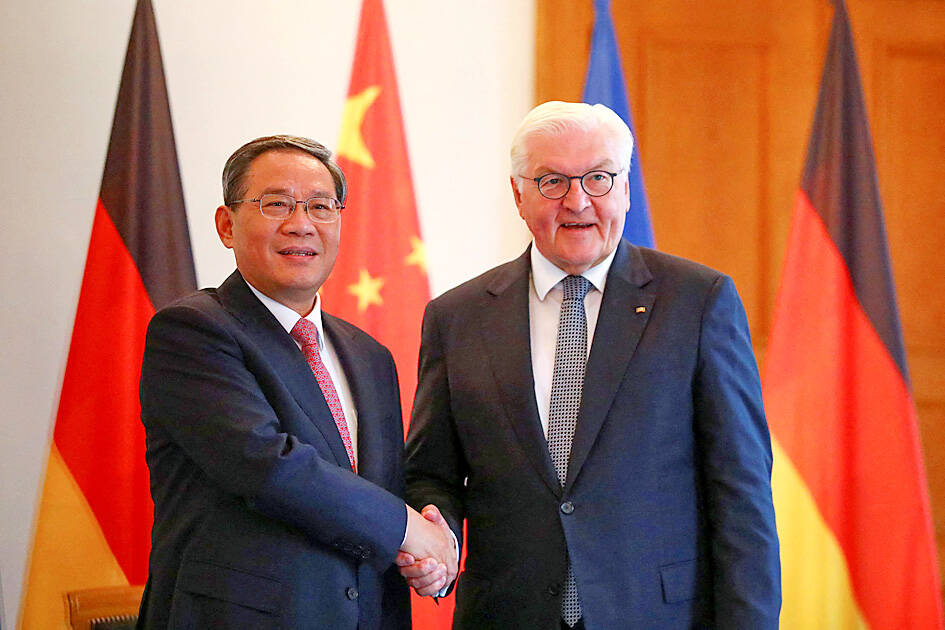German President Frank-Walter Steinmeier yesterday urged Beijing and Washington to boost dialogue, as he hosted Chinese Premier Li Qiang (李強) at a time when China’s policies on Russia, trade and human rights are receiving an increasingly hostile reception in the West.
Li is on a two-nation visit which is also to take him to France for a climate financing summit hosted by French President Emmanuel Macron.
Steinmeier stressed the importance of ties between China and the US for “global security and cooperation,” his spokeswoman Cerstin Gammelin wrote on Twitter.

Photo: Reuters
“He called for the strengthening of communication channels between both countries,” she added, after months of US-China tensions.
Steinmeier also urged Beijing to use its “political weight and influence on Russia to bring about a just peace” in Ukraine, Gammelin said.
Li and his Cabinet are to meet German Chancellor Olaf Scholz and his team for so-called government consultations today, when he is expected to outline China’s “hopes to deepen and expand its relations” with the EU heavyweight, but Germany’s first national security strategy, published days ago, could set the tone at the talks.
The blueprint stridently accused China of acting against German interests, putting international security “under increasing pressure” and disregarding human rights. At the same time, it underlined the necessity of getting Beijing’s cooperation on global issues such as fighting climate change.
Scholz himself had said the message sent by the document is that “China’s integration into world trade and world economic relations should not be impaired, but at the same time the security issues that arise for us must be taken into account.”
Beijing has bristled at being described as a “partner, competitor and systemic rival” in the text, saying such labels would only “push our world towards a vortex of division and confrontation.”
Diversifying has now become a buzzword in Germany, with Berlin wooing more partners beyond the world’s biggest powers. Inconveniently for China, the shift is happening when the Asian giant is experiencing an economic slowdown.
Sluggish exports and domestic demand are weighing on China’s post-pandemic economy.
No surprise, then, that Li picked Germany as his first stop abroad, analysts said.
Li is “in charge of fixing the economy, which is in trouble,” said Ian Johnson, China expert at US think tank the Council on Foreign Relations. “So it makes sense to go to China’s biggest trading partner in Europe.”

‘TAIWAN-FRIENDLY’: The last time the Web site fact sheet removed the lines on the US not supporting Taiwanese independence was during the Biden administration in 2022 The US Department of State has removed a statement on its Web site that it does not support Taiwanese independence, among changes that the Taiwanese government praised yesterday as supporting Taiwan. The Taiwan-US relations fact sheet, produced by the department’s Bureau of East Asian and Pacific Affairs, previously stated that the US opposes “any unilateral changes to the status quo from either side; we do not support Taiwan independence; and we expect cross-strait differences to be resolved by peaceful means.” In the updated version published on Thursday, the line stating that the US does not support Taiwanese independence had been removed. The updated

‘CORRECT IDENTIFICATION’: Beginning in May, Taiwanese married to Japanese can register their home country as Taiwan in their spouse’s family record, ‘Nikkei Asia’ said The government yesterday thanked Japan for revising rules that would allow Taiwanese nationals married to Japanese citizens to list their home country as “Taiwan” in the official family record database. At present, Taiwanese have to select “China.” Minister of Foreign Affairs Lin Chia-lung (林佳龍) said the new rule, set to be implemented in May, would now “correctly” identify Taiwanese in Japan and help protect their rights, the Ministry of Foreign Affairs said in a statement. The statement was released after Nikkei Asia reported the new policy earlier yesterday. The name and nationality of a non-Japanese person marrying a Japanese national is added to the

AT RISK: The council reiterated that people should seriously consider the necessity of visiting China, after Beijing passed 22 guidelines to punish ‘die-hard’ separatists The Mainland Affairs Council (MAC) has since Jan. 1 last year received 65 petitions regarding Taiwanese who were interrogated or detained in China, MAC Minister Chiu Chui-cheng (邱垂正) said yesterday. Fifty-two either went missing or had their personal freedoms restricted, with some put in criminal detention, while 13 were interrogated and temporarily detained, he said in a radio interview. On June 21 last year, China announced 22 guidelines to punish “die-hard Taiwanese independence separatists,” allowing Chinese courts to try people in absentia. The guidelines are uncivilized and inhumane, allowing Beijing to seize assets and issue the death penalty, with no regard for potential

‘UNITED FRONT’ FRONTS: Barring contact with Huaqiao and Jinan universities is needed to stop China targeting Taiwanese students, the education minister said Taiwan has blacklisted two Chinese universities from conducting academic exchange programs in the nation after reports that the institutes are arms of Beijing’s United Front Work Department, Minister of Education Cheng Ying-yao (鄭英耀) said in an exclusive interview with the Chinese-language Liberty Times (the Taipei Times’ sister paper) published yesterday. China’s Huaqiao University in Xiamen and Quanzhou, as well as Jinan University in Guangzhou, which have 600 and 1,500 Taiwanese on their rolls respectively, are under direct control of the Chinese government’s political warfare branch, Cheng said, citing reports by national security officials. A comprehensive ban on Taiwanese institutions collaborating or